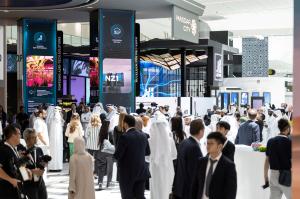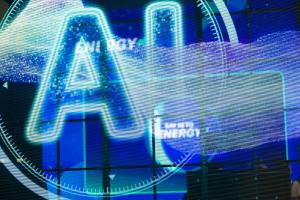ABU DHABI, UNITED ARAB EMIRATES, November 27, 2025 /EINPresswire.com/ — As artificial intelligence emerges as a transformative force in the clean energy sector, the World Future Energy Summit 2026 will spotlight its vast potential to reshape energy production, transmission, and efficient, data-driven distribution. Running from January 13-15 at Abu Dhabi National Exhibition Centre (ADNEC), the three-day show is an integral part of Abu Dhabi Sustainability Week 2026.
With the theme of AI running across all seven conference tracks at this year’s show, the 2026 edition will build on that momentum, raising the bar with the launch of the FUSE AI Zone, a dedicated platform where more than 40 companies will showcase cutting-edge AI solutions to drive clean energy, smart infrastructure, and climate resilience. The event will also incorporate the inaugural Artificial Intelligence Conference, a forum exploring how AI can be responsibly harnessed to accelerate progress across the energy, infrastructure, and smart cities sectors.
Gathering thought leaders, innovators, and policy influencers, the Summit will laser in on AI’s predictive power and its ability to optimise the management of clean energy flows, providing a vital technical boost to help low-carbon systems scale effectively.
Using AI to Accelerate Technical Breakthroughs
In the Middle East and North Africa (MENA), AI adoption is accelerating across multiple areas, from grid and demand-response management to sector coupling and system maintenance. Advances in forecasting and energy storage are also enhancing performance, enabling companies to deliver renewable energy with greater efficiency and reliability. Yet important questions remain about how best to unlock AI’s full potential to power the sustainable energy systems of the future.
For example, can AI make up for shortcomings in energy policy that hold back the transition to carbon-free energy? Can it accelerate innovation to enable researchers and entrepreneurs to more rapidly test and prove technologies that make a direct impact on decarbonisation? These pressing issues, plus the potential of AI to advance the exploration of mineralisation for carbon capture, will be addressed by leading experts at January’s World Future Energy Summit, now globally recognised as the world’s premier business event focused on future energy and sustainability.
The UAE’s clean energy goals, driven by its Net Zero by 2050 Strategic Initiative, involve increasing clean energy to 50 per cent of the total energy mix by 2050, reducing carbon emissions by 70 per cent, and tripling renewable energy capacity by 2030. AI will be a key enabler for achieving these clean energy targets across the region.
The World Future Energy Summit and Abu Dhabi Sustainability Week’s Advisory Committee’s 2025 AI and Technology Insights Report supports this, stating that AI can significantly enhance the efficiency and reliability of clean energy and infrastructure networks both regionally and globally.
According to the report, smart grid algorithms can accurately predict and then balance electricity supply and demand in real time, integrate renewables, and reduce the need for constructing new power plants. Investment in digital infrastructure and skills is key, however, so that utilities can harness data for grid optimisation and predictive maintenance.
Driving Energy Efficiency in Homes and Businesses
The 2026 edition will also highlight the growing role of AI in enhancing energy efficiency within buildings. According to the World Economic Forum, AI technologies are already helping companies reduce energy consumption by up to 60 per cent in some cases.
While the industry has only just begun to tap into AI’s full potential in this field, the opportunities for progress are vast. Through panel discussions and keynote sessions, a powerhouse of industry experts will explore the key challenges and opportunities surrounding energy efficiency in homes and businesses across the MENA region and beyond.
Speakers will discuss how new AI- and automation-powered design tools can help create spaces that are energy-, water- and people-efficient, all while staying within budget. They will also examine how smart software can rapidly test design options to identify solutions that cut costs and reduce environmental impact. Additional sessions will address how innovation, collaboration, and resilient supply chains can help build sustainable urban futures.
Shyam Parmar, the Summit’s Event Director, added: “By bringing together some of the brightest minds from across the global energy landscape, the World Future Energy Summit plays a pivotal role in unlocking the vast potential of artificial intelligence, not only to drive greater energy efficiency in homes and businesses, but to accelerate progress across the entire clean energy and sustainability ecosystem.
“The new FUSE AI Zone and Artificial Intelligence Conference provide an unparalleled platform for knowledge exchange, collaboration, and lively debate on how AI can be deployed responsibly and effectively. These conversations are vital to advancing the AI agenda and ensuring companies can fully harness their capabilities to meet clean energy ambitions. By facilitating this dialogue, we’re helping to translate innovation into action, and turning bold ideas into tangible outcomes that move the world closer to a sustainable energy future.”
Understanding AI’s Energy Consumption
AI’s transformative potential is undeniable, yet credible estimates project AI-related electricity consumption could grow by as much as 50 per cent each year from 2023 to 2030. The electricity demand of data centres is also projected to grow, from one per cent of global energy demand in 2022 to more than three per cent by 2030.
In January 2025, Masdar and Emirates Water and Electricity Company announced the launch of the world’s first large-scale round-the-clock giga-scale project, combining solar power and battery storage in Abu Dhabi. Delivering up to one gigawatt of baseload power every day generated from renewable energy, it will be the largest combined solar and battery energy storage system in the world.
According to the 2025 AI and Technology Insights Report, such projects could redefine how critical AI systems are powered, eliminating the need for fossil fuel-backup. By connecting to clean energy sources, AI data centres could operate with near-zero carbon emissions, marking a major step towards a more sustainable digital future.
The Summit will explore ways to tackle AI’s energy footprint with a dedicated panel session on actionable strategies to realign AI growth with climate goals, balance energy consumption, and drive sustainable innovation without sacrificing usability.
“AI’s role in climate and environmental systems is expanding rapidly and understanding how to guide that growth is becoming just as important as advancing the technology itself,” said Mehdi Ajana, Head of Strategy at Nabat. “At the World Future Energy Summit, we’ll look at practical, data-driven approaches, from improving habitat classification and health assessment model accuracy, to monitoring carbon and biodiversity metrics that help align AI innovation with measurable climate outcomes”.
“It’s a great opportunity for like-minded organisations to come together, listen, learn, and explore what’s possible and to understand how AI can be deployed responsibly to accelerate real progress towards global sustainability goals.”
Paving the Way to a Sustainable Future
The 2026 edition of the World Future Energy Summit will also explore the role of AI in healthcare, food security, and weather modelling, with a keynote presentation on Earth Two Climate, G42, and NVIDIA’s new AI-powered weather forecasting solution that accurately gauges weather conditions down to a single square-metre. This is invaluable to farmers and smart agriculture planners, who can make more informed decisions on crop choices, yield expectations, maintenance procedures, and more.
From cutting energy waste to improving health outcomes and driving farming efficiencies, AI is a powerful means to accelerate sustainability solutions. According to the 2025 AI and Technology Insights Report, however, it must be guided by clear human-defined goals: “Technology deployments should focus on solving real problems rather than adopting AI for AI’s sake”. That means human oversight, strategic vision, and multidisciplinary collaboration should be seen as essential in order to convert AI’s promise into tangible progress, paving the way to a cleaner, greener, and more sustainable future.
The World Future Energy Summit 2026, hosted by Masdar and part of Abu Dhabi Sustainability Week, will take place from January 13–15 at ADNEC Centre Abu Dhabi. For visitor registration, visit: https://www.worldfutureenergysummit.com/en-gb/register-now.html
– ENDS –
World Future Energy Summit:
As the largest event during ADSW, the World Future Energy Summit continues to be a driving force for innovation, collaboration, and thought leadership in renewable energy and sustainability. Now entering its 18th edition, the Summit has established itself as a vital platform bridging policy with real-world action and business growth.
The 2026 edition, taking place from 13–15 January, will feature more than 800 global brands, the dynamic Greenhouse start-up zone, the Fuse AI cleantech pavilion, and the debut of the Greenpeace Cinema. Over three days, attendees will have the opportunity to join conferences led by 300+ industry experts, explore nine exhibition halls showcasing breakthrough products and solutions, and connect with more than 50,000 participants from across the globe.
About Abu Dhabi Sustainability Week
Abu Dhabi Sustainability Week (ADSW) is a global platform supported by the UAE and its clean energy leader, Masdar, to address the world’s most pressing sustainability challenges through crucial conversations accelerating responsible development and fostering inclusive economic, social and environmental progress.
For more than 15 years, ADSW has convened decision-makers from governments, the private sector and civil society to advance the global sustainability agenda through dialogue, cross-sector collaboration and impactful solutions. Throughout the year, ADSW conversations and initiatives facilitate knowledge sharing and collective action that will ensure a sustainable world for future generations.
About Masdar
Established in 2006, Masdar (Abu Dhabi Future Energy Company) is a global clean energy leader, transforming how the world produces and consumes energy through bold innovation and commercial excellence.
Masdar is a clean energy investor, developer and operator, advancing renewable energy projects across key markets and technologies, with a global project portfolio capacity to date of over 51 gigawatts (GW).
Jointly owned by TAQA, ADNOC and Mubadala, Masdar is driving the scale-up of renewables worldwide, targeting a portfolio capacity of 100GW by 2030.
Contact:
For media inquiries, please contact: press@masdar.ae |
For more information, please visit: https://www.masdar.ae and connect: facebook.com/Masdar.ae and twitter.com/Masdar
Deepra Ahluwalia
Action Global Communications
+971 564770995
email us here
Legal Disclaimer:
EIN Presswire provides this news content “as is” without warranty of any kind. We do not accept any responsibility or liability
for the accuracy, content, images, videos, licenses, completeness, legality, or reliability of the information contained in this
article. If you have any complaints or copyright issues related to this article, kindly contact the author above.
![]()



